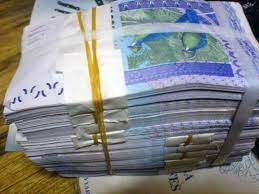SENETOILE BLOGS
Fast backlinks and Guest-post hosting
Will the BRICS dethrone the dollar?

Russian President Vladimir Putin greets South African President Cyril Ramaphosa at the 2019 Russia-Africa Summit in Sochi on October 23, 2019. Sergei CHIRIKOV / POOL / AFP
Winds of change blow at BRICS
The global economic landscape is witnessing a seismic shift as the BRICS bloc, comprised of Brazil, Russia, India, China and South Africa, sets its sights on dethroning the mighty US dollar. As geopolitical tensions run-high between the United States and China, and Russia's invasion of Ukraine continues to send shockwaves through global markets, the BRICS nations are quietly formulating initiatives aimed at challenging the dominance of the greenback.
The US ambassador's recent accusation that South Africa is clandestinely supplying weapons to Russia for the Ukrainian conflict strained already delicate ties between the US and South Africa further. South Africa has been attempting to maintain a neutral stance in the conflict, but its historical connections with Russia have complicated its diplomatic position.
The upcoming BRICS summit, scheduled to take place in Johannesburg this August, promises to be a venue for high-stakes diplomacy. South Africa faces a high-profile diplomatic dilemma as it is obligated under international law to arrest Russian President Putin, who has been indicted by the International Criminal Court for violating the Fourth Geneva Convention. This summit could potentially fan tensions and create further diplomatic ripples.
While geopolitical theatrics dominate the headlines, the BRICS nations are quietly pursuing a more profound agenda: challenging the longstanding supremacy of the US dollar.
The dominance of the dollar, established through institutions like the IMF and the World Bank, is increasingly viewed as a relic of a bygone era, out of touch with the realities of a multipolar world. While the journey toward a unified BRICS currency remains uncertain and complex, the gradual erosion of the dollar's hegemony is undeniable.
As bilateral agreements, alternative payment systems and gold reserves are leveraged to diminish reliance on the greenback, the world is witnessing a seismic shift in the global economic landscape.
The BRICS bloc is not merely rattling the cage; it is vying to rewrite the rules of the game, for a future where global finance lies in a multipolar world, economic power is dispersed, and alternatives to the dollar take centre stage.
source: African Business
BUSINESS BRIEFS
RAISING THE ROOF | African central banks have taken the surprising step of significantly hiking benchmark lending rates, aiming to curb stubborn inflation. But the move risks stifling investment, particularly for SMEs, as higher borrowing costs and a conservative investment environment emerge, hampering economic growth in the region.
HUSTLER FUND | Kenya launched of the second product of the Financial Inclusion Fund, known as the Hustler Group Loan, on Thursday, providing affordable credit access to millions of entrepreneurs and propelling economic growth, with $219m (Sh30bn) in loans already disbursed. The Fund is credited with facilitating 42.5m transactions and empowering 20.2m Kenyans, while driving agricultural productivity for a more prosperous and inclusive Kenya.
BIGOTRY BACKFIRES | Uganda's enactment of one of the world's harshest anti-LGBTQ law faces fierce repercussions as the US President threatens trade sanctions, travel restrictions, and re-evaluates aid programmes. Will President Joe Biden's call for the immediate repeal of the law fall on deaf ears?
DIPLOMATIC DANCE | Kenyan President William Ruto has appointed Kamau Thugge as the new governor of the Central Bank of Kenya as East Africa's powerhouse confronts ballooning debts and a weakening currency. Can the former Treasury principal secretary and IMF economist stabilise the currency, curb inflation, and manage foreign reserves amid Moody's downgrade of Kenya's credit rating?







